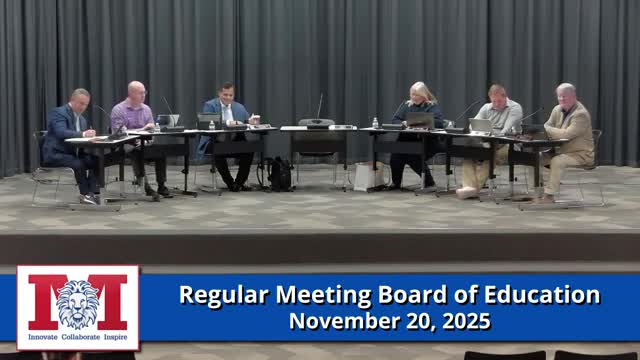Developers pitch 590‑acre Marysville South site; board approves donation/pilot agreement tied to 15‑year abatement
Get AI-powered insights, summaries, and transcripts
Subscribe
Summary
Developers presented 'Project Flannel' (Marysville South), proposing ~590 acres, a potential $1 billion Phase 1, 800,000 sq. ft., and a requested 15‑year, 100% tax abatement; the board approved a resolution authorizing community reinvestment area exemptions and a donation/pilot agreement, subject to further city and development approvals.
At the Nov. 20 Marysville Exempted Village School District meeting, representatives from the Marysville Land Company and county economic development outlined a proposed industrial/data‑center development on a roughly 590‑acre parcel called Marysville South and asked the board to approve a resolution supporting community reinvestment area (CRA) exemptions and execution of a donation (pilot) agreement.
Matt McQuade of the Marysville Land Company called the site “Marysville South,” across from the 33 Innovation Park, and said the prospect could bring a first phase with an estimated $1 billion capital investment, about 800,000 square feet of development and roughly 50 full‑time permanent jobs with construction workforce increases during build‑out. The developer and county representative said the company is considering multiple locations and that the requested 15‑year, 100% property‑tax abatement — together with pilot/donation payments — is a critical factor in its decision.
Eric (Speaker 13), who presented financials, described the proposed incentive package: a 15‑year, 100% abatement combined with a pilot (payment‑in‑lieu) structure that, he said, would deliver a little over $1 million per year to the school district, totaling approximately $16.1 million over 15 years in pilot payments. Eric added that when pilot payments and land‑increment taxes are considered, the net effect is less than a full 100% abatement — his example estimated a roughly 62% effective abatement when pilots are counted.
Developers and staff described community mitigation measures added in the rezoning and PUD process: expanded setbacks for pavement (150 feet) and buildings (200 feet) on the west side abutting residences, construction of a 12‑foot mound with six feet of landscaping for screening, and routing primary traffic to Industrial Parkway with a planned overpass to keep traffic off Weaver Road. Zoning changes earlier this year made data centers a permitted use in the updated district.
Board members pressed for fiscal clarity and timelines: who recalculates proration of pilot payments (CIC economic development will calculate annually, with school collaboration), whether the Marysville Southeast New Community Authority (NCA) development charge would reduce school payments (presenters said no), and when payments would begin (example trigger: 40% estimated completion as determined by the county auditor; earliest likely tax year 2027 or 2028 depending on engineering and overpass schedule).
Board members expressed support for the potential revenue gains (land‑increment and income tax sharing) while emphasizing the conditional nature of the income — revenue depends on the company deciding to develop and on subsequent engineering, design review and development agreements. Several members noted the project is not expected to add meaningful student enrollment pressure but could provide higher‑paying jobs and broaden the commercial tax base.
After discussion the board voted to approve a resolution authorizing the CRA real property tax exemptions and execution of the donation/pilot agreement; the motion passed on the recorded vote. Presenters said subsequent approvals (development agreements, design review, engineering) and a city council process remain in front of the company and the community.
